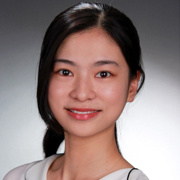
Dr. Dan Song
Research Area C | Hermann Staudinger Fellow Recipient 2019
Cluster of Excellence livMatS @ FIT – Freiburg Center for Interactive Materials and Bioinspired Technologies
Projects
Abscission and self-repair in biological and artificial materials systems
Subproject
Novel Materials for maskless lithography and 3D printing
The goal of my research is to develop novel material systems for livMatS demonstrators. These materials can be written by UV light of certain wavelengths, which makes them useful in techniques such as maskless lithography and 3D printing based on light-on-and-off technology. We want to use these materials and techniques to generate objects and demonstrators such as micro-structured functional skins or objects with specific adaptive properties, e.g. responsive to humidity.
Project outcomes
Material systems based on C,H-insertion crosslinking (CHic) can be tailored by copolymerizing a wide variety of components. This capability not only broadens the spectrum of materials available for utilization but also offers the possibility of producing functional patterns and microstructures. For generating customized surface patterns, a maskless photolithography technique based on digital micromirror devices (DMDs) was utilized. Rapid, flexible, and cost-effective fabrication of surface patterns with a broad spectrum of geometries has been achieved. The widely applicable CHic reaction enables pattern generation on various materials, irrespective of the nature of the chosen substrates. The surface functionalization patterns were pre-programmed and successfully generated with a high degree of spatial control. Regarding 3D printing, direct laser writing (DLW) was utilized to produce high-precision 3D microstructures with complex geometries and customized properties using CHic-able materials. The generated microstructures were successfully used as 3D cell culture platforms, exhibiting excellent biocompatibility and cellular adhesion. Impressively, the one-step fabrication of tailored multi-component scaffolds, with precisely defined geometries and integrated multiple properties, has been realized. The capability of such tailored scaffolds in manipulating individual cell adhesion and morphology has been demonstrated, indicating the great promise of this approach for advancements in biological research and medical applications.
Supervisor and dissertation
Prof. Dr. Jürgen Rühe
Dan Song successfully defended her dissertation in February 2024.
Publications in livMatS
- Generation of Tailored Multi-Material Microstructures Through One-Step Direct Laser Writing
Song, D., Lizheng, Liu, Anyman Husari, Kotz‐Helmer, F., Tomakidi, P., Rapp, B. E., & Rühe, J. (2023). Generation of Tailored Multi-Material Microstructures Through One-Step Direct Laser Writing. Small, 2306682. doi: 10.1002/smll.202405586 - Two-Photon Direct Laser Writing of 3D Scaffolds through C, H-Insertion Crosslinking in a One-Component Material System*
Song, D., Husari, A., Kotz‐Helmer, F., Tomakidi, P., Rapp, B. E., & Rühe, J. (2023). Two‐Photon Direct Laser Writing of 3D Scaffolds through C, H‐Insertion Crosslinking in a One‐Component Material System. Small, 2306682. doi: 10.1002/smll.202306682 - Substrate-Independent Maskless Writing of Functionalized Microstructures Using CHic Chemistry and Digital Light Processing*
Song, D., Kotz-Helmer, F., Rapp, B., & Rühe, J. (2022). Substrate-Independent Maskless Writing of Functionalized Microstructures Using CHic Chemistry and Digital Light Processing. ACS Applied Materials & Interfaces. doi: 10.1021/acsami.2c12000
* Funded by the Deutsche Forschungsgemeinschaft (DFG, German Research Foundation) under Germany's Excellence Strategy – EXC-2193/1 – 390951807